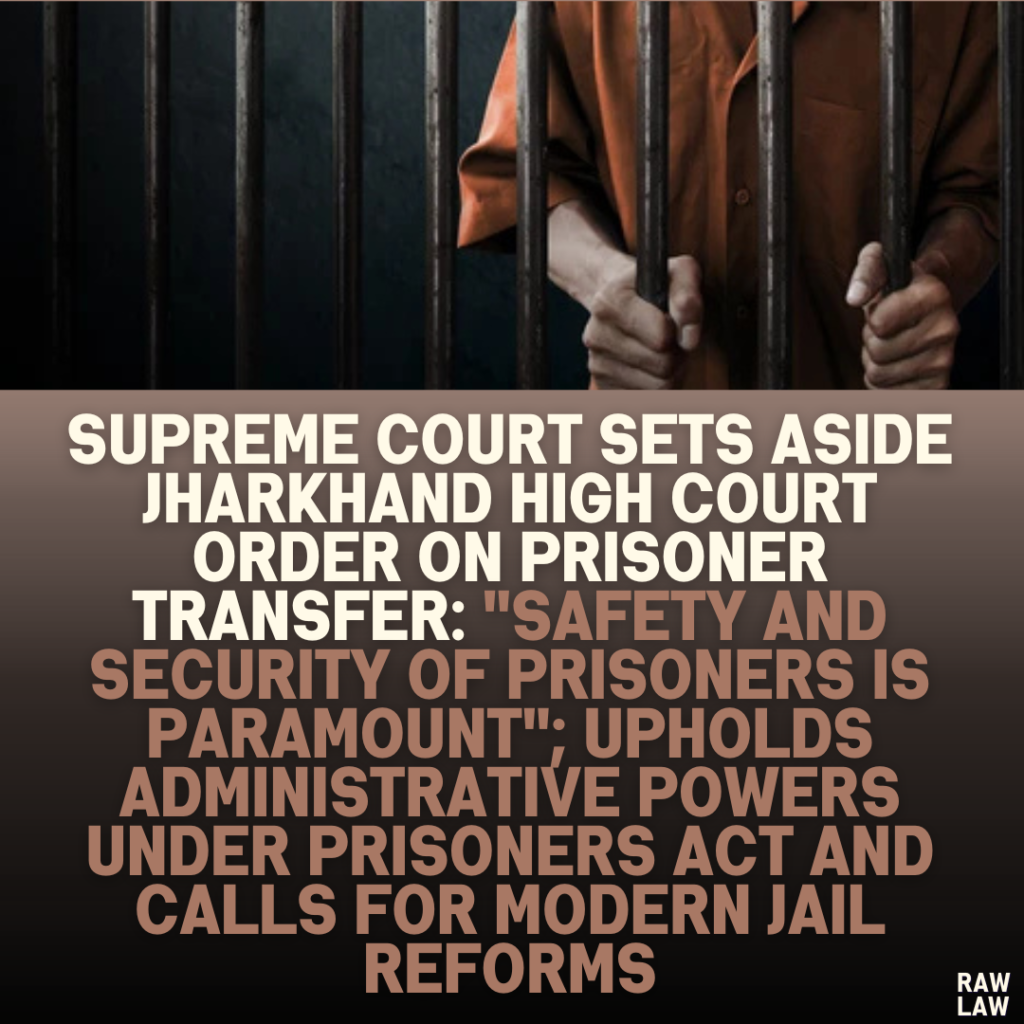Court’s Decision
The Supreme Court reversed the High Court of Jharkhand’s decision, reinstating the transfer order of a convicted prisoner issued by the Inspector General of Prisons. It held that the transfer, made to ensure prison security and avoid gang violence, was lawful and necessary under Section 29 of the Prisoners Act, 1900, and Rule 770(B) of the State Jail Manual.
The Court emphasized that decisions concerning prison administration, including inmate transfers, are primarily administrative. Courts should intervene only when such decisions are arbitrary or violate specific legal provisions.
Facts
- The respondent, a life-convict, was imprisoned in Hazaribagh Central Jail for various offenses, including murder and criminal conspiracy. He was also implicated in numerous other cases.
- The Inspector General of Prisons ordered the respondent’s transfer to a jail in Santhal Pargana based on a letter from the Jail Superintendent, citing security concerns. The letter highlighted the risk of gang wars due to the presence of two notorious criminals, including the respondent, in the same prison.
- The High Court quashed the transfer order, relying on a character certificate issued by the Jail Superintendent and citing precedents related to undertrial prisoners.
Issues
- Was the transfer order issued in accordance with Section 29 of the Prisoners Act, 1900, and Rule 770(B) of the State Jail Manual?
- Did the High Court err in relying on precedents related to undertrial prisoners for a case involving a convicted prisoner?
- Were the respondent’s rights under Article 21 of the Constitution violated by the transfer?
Petitioner’s Arguments
- The State argued that the transfer was necessitated by security concerns. The respondent, a notorious gangster, was involved in multiple criminal cases, and his presence in the same prison as another gangster heightened the risk of gang wars.
- The Jail Superintendent and District Commissioner recommended the transfer to maintain prison security and discipline.
- The character certificate issued by the Jail Superintendent after the transfer order was contradictory to prior findings and could not override valid security concerns.
- The decision was lawful under Section 29 of the Prisoners Act and Rule 770(B) of the State Jail Manual.
Respondent’s Arguments
- The respondent claimed the transfer order was arbitrary, made without evidence of any incidents involving him in prison.
- The character certificate, which described his conduct as satisfactory, demonstrated the lack of necessity for a transfer.
- Transferring the respondent to a distant jail would prejudice his ability to defend himself in pending cases in nearby courts.
- The High Court rightly relied on precedents like Saeed Sohail Sheikh v. State of Maharashtra to quash the transfer.
Analysis of the Law
- Section 29 of the Prisoners Act, 1900:
Empowers the State Government or Inspector General of Prisons to transfer prisoners for valid reasons, including maintaining discipline and security within prisons. - Rule 770(B) of the State Jail Manual:
Allows the Inspector General of Prisons to transfer prisoners on sufficient grounds, such as the risk of violence or threats to prison security. - Precedents:
- Kalyan Chandra Sarkar v. Rajesh Ranjan: The Court upheld the transfer of prisoners to ensure discipline and security, emphasizing that administrative decisions related to prison management must not be interfered with lightly.
- Sunil Batra v. Delhi Administration: Highlighted that prisoners retain their dignity and rights under Article 21 but are subject to lawful restrictions.
- Saeed Sohail Sheikh v. State of Maharashtra: Applied to undertrial prisoners and was misinterpreted by the High Court in this case involving a convicted prisoner.
Precedent Analysis
The Court noted that the High Court misapplied precedents meant for undertrial prisoners, such as Saeed Sohail Sheikh v. State of Maharashtra. It clarified that the rights and legal treatment of convicted prisoners differ from those of undertrial prisoners. Convicted prisoners are subject to stricter administrative controls to ensure prison discipline and security.
Court’s Reasoning
- Legality of the Transfer:
The transfer order was valid under Section 29 of the Prisoners Act and Rule 770(B) of the State Jail Manual. The Inspector General acted within his powers to address legitimate security concerns. - Security Concerns:
The presence of two notorious gangsters in the same prison posed a significant risk of gang wars, endangering the lives of other inmates and prison staff. The transfer was essential to neutralize this threat. - Character Certificate:
The Court rejected the High Court’s reliance on the character certificate, noting that it contradicted earlier reports from the same Jail Superintendent about the respondent’s potential to incite violence. - Judicial Interference:
Administrative decisions regarding prison transfers should be respected unless they are arbitrary or illegal. The High Court’s interference in this case was unwarranted. - Larger Interest:
The transfer was not only lawful but also necessary for maintaining prison discipline and ensuring the respondent’s safety, given the potential for gang-related violence.
Conclusion
The Supreme Court set aside the High Court’s decision and restored the transfer order. It directed the State of Jharkhand to ensure the respondent’s safety and expedite the formulation of a Jail Manual aligned with the 2016 Model Prison Manual to improve prison administration.
Implications
- Reaffirmation of Administrative Powers:
The judgment underscores the authority of prison officials to make decisions for maintaining security and discipline. - Clarification of Prisoner Rights:
Highlights the distinction between the rights of convicted and undertrial prisoners, reaffirming that administrative actions for security take precedence. - Call for Prison Reforms:
The Court’s direction to the State to adopt the Model Prison Manual highlights the need for uniformity and modernization in prison administration.




Pingback: Delhi High Court Cancels Trademark "GREEN DIAMOND," Holds It Deceptively Similar to "DIAMOND" and Adopted with Dishonest Intent to Exploit Established Goodwill: "Trademark Law Protects Long-Standing Reputation from Misuse" -
Pingback: Bombay High Court on Transfer Tenure of Group-C Employees: "No Right to Demand Two Full Tenures" Under Section 3(1) Proviso of the Transfer Act - Raw Law